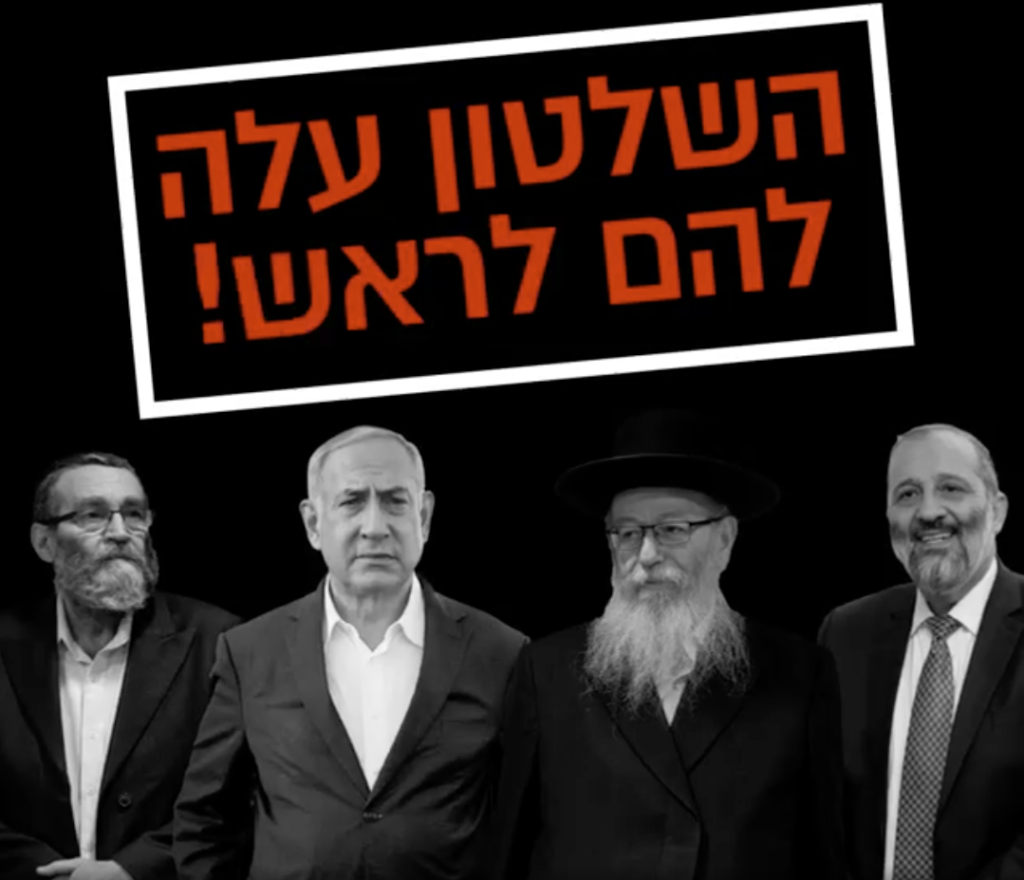Australia/Israel Review
Campaigning – amid campaign fatigue
Mar 4, 2021 | Ahron Shapiro

Entering the final weeks before Israel’s March 23 national election, parties have unveiled their campaigns – while struggling to say something fresh after three previous campaigns in just the past two years. With 39 parties jockeying for 120 Knesset seats – up from 30 in the last election – and at least four parties hovering around the four-seat minimum threshold for entering the Knesset, competition for undecided voters is fierce.
In the age of smartphones and social media, the traditional campaign commercials which begin airing on Israeli television a couple of weeks before an election, no longer carry the impact they once had. But while the medium has changed, the name of the game – crafting persuasive messaging to convince voters to choose your party’s ballot paper once they enter the voting booth – has not. The following is a survey of campaign messaging by parties likely to enter the next Knesset, presented in order of each party’s current popularity in the polls.

A Likud ad shows a woman using a dating app and only liking men who have been vaccinated for COVID-19
Likud (polls estimate: ~29 seats; current Knesset seats: 36)
Slogan: “Only the Likud will bring a fully right-wing government”
Post-election scenarios suggest three potential challengers to Prime Minister Binyamin Netanyahu – Yesh Atid’s Yair Lapid, New Hope’s Gideon Sa’ar, and Yamina’s Naftali Bennett – but Likud has singled out Lapid as Netanyahu’s true rival, a matchup which polls best with right-wing voters. A recent attack ad portrayed Lapid as weak on the economy, COVID-19 response and the Iranian threat. Addressing the other challengers as an aside, the Likud’s campaign ad warns “Every vote for Sa’ar or Bennett is a vote for Lapid, who will form a left-wing government.”
Likud appears on track to receive nearly 25% fewer votes than it received at the last election, but the party is hoping that Israel’s successful vaccination campaign, led by Netanyahu, will lure former Likud voters back to the fold. In tandem with its campaign ads, Likud has also released apolitical ads aimed at younger Israelis urging them to get vaccinated.
Yesh Atid (polls: ~18 seats; current Knesset seats: 16)
Slogan: “Sane government”
Yair Lapid’s Yesh Atid (“There is a Future”) party is polling strongly, perhaps close to the high point it achieved in 2013 of 19 seats, outdoing Sa’ar and Bennett. This leaves Lapid well-situated to be recommended for prime minister in any alternative coalition which succeeds in displacing Netanyahu, or at least to get first go in a rotation agreement.
Lapid’s ads explore the theme of an alternative “sane” government, as opposed to what they call today’s “insane” Government, sometimes in humorous ways, other times in a more serious tone. Its logo for the election replaces the zero in the year 2021 with an image of a rising sun.
In one of Lapid’s popular ads, he lists reforms he promises to pass within his first 100 days in office: unemployment benefits for the self-employed; term limits for prime ministers; limiting the number of government ministers; legalising civil marriages; reforming surrogacy laws to include members of the LGBTQI community and amending the controversial Nation-State law.
New Hope (polls: ~15 seats; new party)
Slogan: “Gideon Sa’ar. Prime Minister for all.”
Former Likud MK Gideon Sa’ar established New Hope in December along with other former Likud members who were unhappy with the party’s direction under Netanyahu. Sa’ar has recently fallen back in the opinion polls after initial surveys suggested he might get 20 or more seats.
New Hope’s ads are aimed at disgruntled Likud voters who support Likud’s right-wing policies but find the party dysfunctional under Netanyahu.
One New Hope commercial shows an Israeli flag shattered like glass, while a voiceover tells potential voters that Netanyahu is to blame for Israel’s political instability. “The one who broke [the system] can’t be the one to fix it,” it says.
As a response to the claim that “Only Netanyahu can bring about a fully right-wing government”, an attack ad by New Hope reminded voters that Netanyahu had formed governments with many left-wing figures including Ehud Barak, Tzipi Livni and Amir Peretz, and that Netanyahu had recently been making overtures to Islamist Mansour Abbas of the Ra’am party.
Yamina (polls:~12 seats; current Knesset seats: 3)
Slogan: “Naftali Bennett. There is alternative leadership”
Yamina (“rightward”) party leader Naftali Bennett soared in the opinion polls over the past year as chief critic of the Government’s COVID-19 response, only to fall back considerably when Sa’ar entered the race.
Bennett’s ads, like those of Lapid and Sa’ar, tout Bennett as an alternative leader to Netanyahu in his own right-wing niche. Unlike Lapid, Bennett speaks as a trusted figure on the right with whom Likud voters can identify. Unlike Sa’ar, Bennett can criticise the Government as someone who spent the last year in opposition.
Bennett’s ads have urged Netanyahu to stick to the issues in the campaign, debate him and “let the public decide” which candidate’s plans are better.
Bennett has recently begun promoting a plan to expedite Israel’s economic recovery by reducing taxes and regulation using Singapore as a model.
Joint List (polls: ~9 seats; current Knesset seats: 11)
Arabic slogan: “Dignity and rights”
The Ayman Odeh-led Joint List is going into the election without Mansour Abbas’ Ra’am faction, which has chosen to run on its own but is currently polling under the electoral threshold, raising the spectre that up to three seats worth of support from Arab voters may end up unrepresented. Arabic language social media by the Joint List focuses on major problems in Israel’s Arab community that the party hopes to target, including gun violence and crumbling infrastructure. The party’s Hebrew language campaign has yet to be rolled out.
Shas and United Torah Judaism (polls: ~15 seats combined; current Knesset seats: 16)
Slogans: Shas: “Israel chooses God.”;
UTJ: “It’s united or nothing!”
For the purposes of brevity, and owing to their similarities, the Sephardic and Ashkenazi ultra-Orthodox or “Haredi” parties, respectively, are discussed here together.
For the most part, the reliable base of both parties delivers between seven and nine seats for each without the need for much campaigning, but both parties use ads to trawl for non-religious voters sympathetic to their traditional and social welfare-heavy agendas. In its campaign videos, Shas has used archival footage of deceased but respected Sephardic rabbis and touted its credentials as a party that looks after the needs of the vulnerable. UTJ has used its social media to shame anti-Haredi campaigns by other parties, but is waiting until closer to election day to launch its own campaign.

Yisrael Beitenu ad shows Binyamin Netanyahu with haredi coalition partners: “The power went to their heads”
Yisrael Beitenu (polls:~9 seats; current Knesset seats: 7)
Slogan: “Lieberman. The end of Haredi rule!”
Riding a wave of frustration over violations of lockdown regulations by some members of Israel’s ultra-Orthodox community, Avigdor Lieberman’s secularist, right-wing Yisrael Beitenu party – part of the anti-Netanyahu bloc – has been producing campaign material that targets voters who support, above all, changing the current Government for one without the participation of Haredi parties.
Labor (polls:~6 seats; current Knesset seats: 2)
Slogan: “Truth in politics”
Newly-elected Labor leader Merav Michaeli has been the face of Labor’s social media campaign. Labor’s videos have claimed that Netanyahu is a liability in terms of convincing the Biden Administration to take a strong stand against the Iranian nuclear threat, and that Israel’s successful vaccination campaign, as touted by Netanyahu, could not have been possible without a public health care system that was created by early Labor governments.
The seventh candidate on Labor’s Knesset list, Arab filmmaker Ibtisam Mara’ana, was disqualified by the Central Elections Committee on Feb 17 over anti-Zionist comments she had made in the past but has since disavowed. Her disqualification is expected to be overturned by the Supreme Court. Nevertheless, the Likud and the far-right Otzma Yehudit faction have targeted Mara’ana in ads attacking Yesh Atid’s Lapid, as he would likely require Labor’s support to form a government.
Meretz (polls:~5 seats; current Knesset seats: 4)
Slogan: “Only Meretz will fight for your values. Meretz, the home of the left.”
Meretz social media ads highlight the issues that the party supports, such as fighting for civil marriage, and opposing religious coercion and West Bank settlements. Meretz had been criticised in the past for failing to include Israeli Arabs in realistic spots on its Knesset list, but this election the party has reserved a spot for Arab educator Rinawie Zoabi, and has been promoting this move in some videos.
Religious Zionism (polls: ~5 seats; current Knesset seats: 2)
Slogan: “The only way to a right-wing government”
Religious Zionism party leader Betzalel Smotrich parted ways with Yamina’s Bennett in early January.
At the urging of Netanyahu, who is seeking to ensure right-wing votes are not wasted by going to parties that fall under the electoral threshold, Religious Zionism agreed to run together with Itamar Ben-Gvir’s far-right Otzma Yehudit (“Jewish Power”) party and the anti-LGBTQI rights Noam party. As part of the deal, Netanyahu also reserved a spot on the Likud list for a Religious Zionism candidate.
Religious Zionism’s social media is aimed at drawing right-wing votes from other parties in the bloc and it has focused its fire at Yamina, which it sees as its main rival. A vulgar video circulated by Otzma Yehudit in the name of the Religious Zionism party smeared several Arab-Israeli politicians and was widely condemned.
Blue and White (polls:~4 seats; current Knesset seats: 12)
Slogan: “Honest government”
Blue and White party leader Benny Gantz has a well-funded campaign centred around his reputation as a clean and honest politician, that includes front-page ads in newspapers and well-crafted videos.
Nevertheless, his party continues to flirt with missing the electoral threshold according to polls. A full-page open letter in the Hebrew daily Yediot Ahronot on Feb. 22, signed by former prime minister Ehud Barak and tens of other former top security officials, called for Gantz to pull his party out of the race in order not to waste votes that might otherwise help topple Netanyahu.






